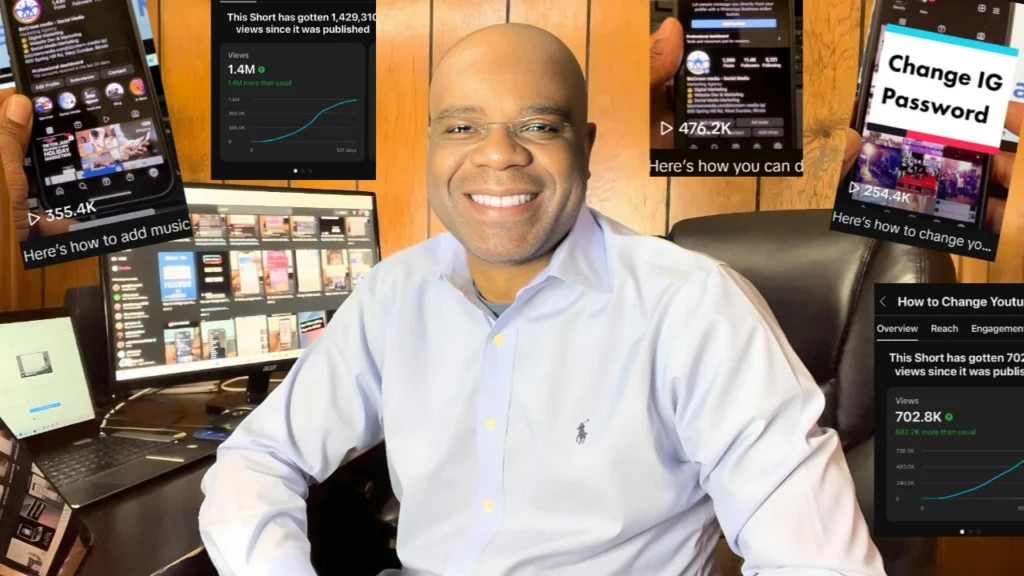With the New Year comes the inspiration for fresh goals. Businesses traditionally evaluate past performances to identify areas for improvement and determine how to achieve new objectives. Recently, a business manager approached me seeking advice on enhancing their marketing strategy to boost customer referrals. Marketing assumes significance when aiming to drive sales and raise awareness in order to meet business goals.
As we step into a new year, neglecting a robust social media strategy in your marketing plan may result in missed opportunities crucial not only for current growth but also for the future sustainability of your business. A well-crafted social media business strategy will not only amplify your online presence but also unearth more avenues for lead generation. As we embark on the New Year, here are five social media business strategies or processes that can be fine-tuned to cultivate awareness and, consequently, attract more customers.
Visual Strategy
The demand for visual content — videos, photos, and captivating visuals — has taken the world by storm. As consumers, we are increasingly drawn to engaging visual cues, and the accessibility of portable devices providing visual content is rapidly expanding on a global scale. Videos, being the most evocative and credible medium, offer an emotional and persuasive way to convey information.
According to Simply Measured, landing pages with videos boast a staggering 800% increase in conversion compared to those without, and videos are shared 1200% more frequently than a combination of links and text. Businesses can capitalize on this phenomenon by offering visually appealing content that resonates with their customer base. This can include instructional videos, “how to” guides, and footage of business events, all of which can be created at affordable rates to make a lasting impression and generate awareness and leads. If your social media communication primarily revolves around text and photo posts, incorporating more video content could prove immensely beneficial in expanding your reach and impact.
Content Theme
Nike doesn’t do food commercials, and Disney doesn’t promote insurance. Their product and brand determine their themes, which in turn shape their marketing communications. Having a consistent marketing communications theme is crucial for establishing a strong brand. If you’re a plumber, it makes more sense to share plumbing tips, updates on relevant laws, and industry news rather than discussing finance, unless it has a direct impact on your business image.
Your business posts should reflect the kind of conversations you want customers to have about your company. They should also prompt people to mention your business name when discussing topics related to your industry. The more your business name gets mentioned in conversations, the better it is for your brand awareness and ultimately for your business. If your social media posts haven’t followed a clear theme, consider selecting themes that are relevant to your business and industry.
These themes will help attract your desired customers to your social accounts and build relationships that can lead to business opportunities. Establishing yourself as an expert in your field is a common goal, and having consistent marketing themes can greatly support that effort.
Schedule
Consistency in social media interactions is crucial for businesses utilizing it as a tool. In my doctoral thesis, which focused on the efficiency of social media as a business tool, I identified the consistency of social interaction as one of the two significant variables impacting its success. Your business, as a brand, must remain relevant and consistently remind people of its existence and offerings to generate awareness and drive sales.
Take McDonald’s, for example. Despite being one of the biggest food chains globally, it constantly airs commercials to reinforce its brand and products in customers’ minds. Similarly, social media acts as a perfect business tool for small businesses to showcase their offerings effectively. Establishing a posting schedule, whether it’s daily, weekly, or monthly, can play a pivotal role. While schedules don’t always have to be rigid, timing matters for post-effectiveness.
For instance, if you want to boost lunch sales, posting lunch specials at 2 p.m. on the same day may not be the ideal approach. However, if the specials run throughout the week, starting the week with a post could be more effective. Ultimately, the goals you aim to achieve with your social media posts will determine the most suitable schedule.
If managing your business’s social media operations within your schedule becomes impractical, you can assign this task to staff, or family members, or even hire a social management company to assist. Additionally, curating feeds and articles from business associates or industry blogs to share on your social media platforms can provide valuable content for your audience.
Calls to Action
Implementing a strategic “Call to Action” is crucial if your goal is to guide customers toward sales pages or detailed product/service information. Calls to action can be as simple as including links to landing pages or, as Instagram has shown us, placing the link in your bio. Different social media platforms may require tailored strategies for effective calls to action. With Twitter’s character limit, conveying a message with fewer words becomes vital, meaning lengthy Facebook posts must be condensed on Twitter.
Marketing strategies or campaigns without clear calls to action often miss their intended goals. Some Facebook teams, like LulaRoe, have mastered the art of call to action by prompting their audience to comment “sold” on the desired outfit post, initiating purchase details. This results in either the removal or editing of the post to reflect the remaining available items. There are numerous creative ways to create impactful calls to action that can greatly contribute to your business goals. It is wise to continually explore potential approaches for your new year strategy.
Platform
Years ago, it was Myspace, then Facebook, Yelp, Twitter, Instagram, Snapchat, and the list goes on and on. As a social media business consultant, there’s always something new to share with clients. New platforms emerge constantly, and existing ones undergo changes. At times, it can feel overwhelming. Numerous social platforms cater to various interests, making it crucial to focus resources on the right ones. Simultaneously, staying alert for new platforms is key.
The platforms your business adopts can make or break your social media success. Facebook is a no-brainer for all businesses these days, but if you’re in the fashion industry, Pinterest might help you build a larger following. Broadcasting enthusiasts might find Periscope or Instagram as the most effective platforms. Choosing the wrong platforms can drain your resources, highlighting the importance of selecting the right ones and implementing a strategy to boost awareness.
To sum up, by revisiting these five strategies, you can effectively create a social media strategy that aligns with your business goals. Social media has become an indispensable tool for businesses of all sizes to engage with customers and strengthen their brand presence. In today’s digital landscape, not having a social media presence is akin to not having a phone for your business…a bit odd, right?
If you’re unsure where to start, consider seeking guidance from a consultant experienced in crafting social media business strategies. If budget is a concern, research what your competitors are doing and reach out to a social media-savvy friend or family member for assistance. Wishing you a productive year ahead as you accomplish your business goals through the power of social media! Feel free to share any strategies you’re refining for the New Year.
For more social media tips and digital app tips, join our newsletter and follow us on social media and YouTube
Contact us for Digital Marketing or Social Media support and assistance.


